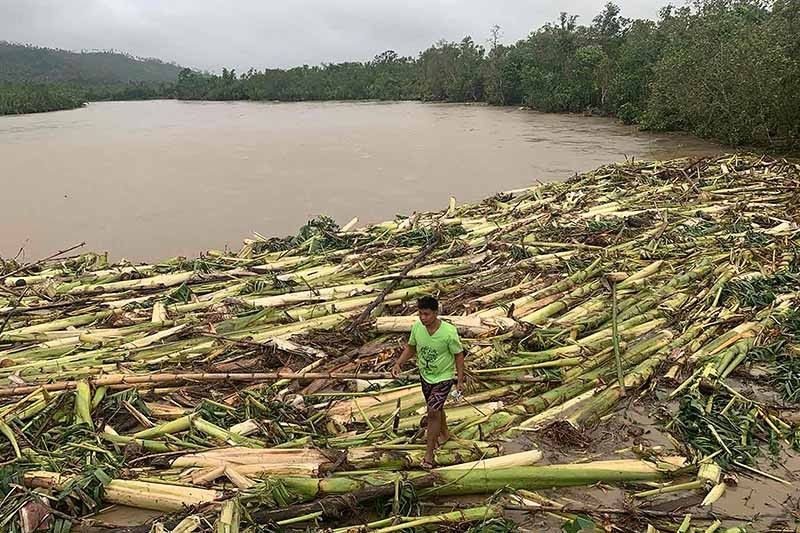MANILA, Philippines — Seven in 10 Filipinos expressed concern they will be affected by the impacts of climate change despite having low level of awareness on the issue, a study of Harvard University’s humanitarian research center suggested.
The research published by the Harvard Humanitarian Initiative on October 20 showed that 71% of Filipinos believed they would be at least “somewhat affected” by the impacts of climate change. Some 46% feared they would get harmed, injured or sick and 22% would suffer loss of income.
Other likely impacts include damage to crops (20%), damage to house and property (19%), and infeasibility of farming and change of livelihoods (18%).
The HHI study also found that around 70% of those living in Metro Manila were particularly concerned about the impacts of climate change on health, while around 57% of residents of Davao region were concerned about its effects on their household income.
Meanwhile, those living in Eastern Visayas, a region frequently battered by cyclones, were most concerned with the impacts of the warming of global temperatures on farming (40%) and on their homes (41%).
The study was based on data collected from a nationally representative random survey of 5,184 adults and was conducted between March and April 2017.
Vincenzo Bollettino, HHI Resilient Communities program director, stressed the data, although collected three years ago, “continue to be relevant today as the impacts of climate change have only worsened.”
Climate change and disasters
Meanwhile, 42% of the respondents believed that disasters they had experienced were due to climate change, while 30% agreed disasters were “somewhat” due to the phenomenon. Nearly a third thought climate change slightly caused or did not cause at all the disasters they had experienced.
The Philippines is an archipelagic country vulnerable to the impacts of climate change. It is subject to frequent flooding, cyclones, sea level rise and drought. From 2000 to 2019, it experienced 304 disasters, which range from geophysical, hydrological and meteorological events, according to a report of the United Nations Office for Disaster Risk Reduction.
Scientific evidence suggests that certain areas of the world will experience an increase in flooding and storm events as a result of climate change. The warming of the world’s temperatures is also expected to increase the risk of droughts.
To prepare for natural disaster, 53% said they had undertaken some form of preparedness activities in the past five years. These include participating in training programs and evacuation drills, storing emergency food and supplies, tying ropes on their homes, preparing emergency kits and monitoring weather updates.
“Previous experience with disasters, education level and health status are all important associations that increase the odds of participation in disaster preparedness activities,” the study read.
Findings of the study also suggested that adaptation to climate change and disaster preparedness are “inherently associated and potentially mutually reinforcing.”
“Policies and programs would arguably benefit from a more unified intervention framework that links climate change adaptation and disaster preparedness,” it said.
Awareness, perception
Sixty percent of the respondents said they had not heard of and did not feel well informed about climate change, showing a low level of public awareness about the issue among Filipinos.
Only 12% felt “extremely well-informed,” while the rest were “somewhat informed.”
The Bicol region, one of the most disaster-prone areas in the country due to its location, had the highest percentage of people who never heard of climate change at 38%.
The HHI research also found that nearly half (47%) of the respondents believed that climate change was due to both natural and human factors. For 32% of the respondents, it was solely due to human activity, while 20% thought it was purely due to natural processes.
Among the top consequences of climate change for Filipinos include increase in temperature (46%), shifting of seasons (42%), heavier rains (23%), more variability in weather patterns (21%), more intense tropical cyclones (13%), more frequent cyclones (7%), more frequent flooding (6%) and delayed onset of the rainy season (4%).
They also reported that deforestation (21%), increased poverty (13%), poor waste disposal (12%), increased population (11%) and worse infrastructure (5%) as the factors contributing to heightening the impact of disasters.
The UN-backed Intergovernmental Panel on Climate Change concluded in its 2018 report that global carbon dioxide emission must drop 45% by 2030 and reach “net zero” by 2050 to cap temperature rise at 1.5 degrees Celsius.
This content was originally published here.
EL 2 DE JUNIO DEL 2024 VOTA PARA MANTENER
TU LIBERTAD, LA DEMOCRACIA Y EL RESPETO A LA CONSTITUCIÓN.
VOTA POR XÓCHITL












Comentarios